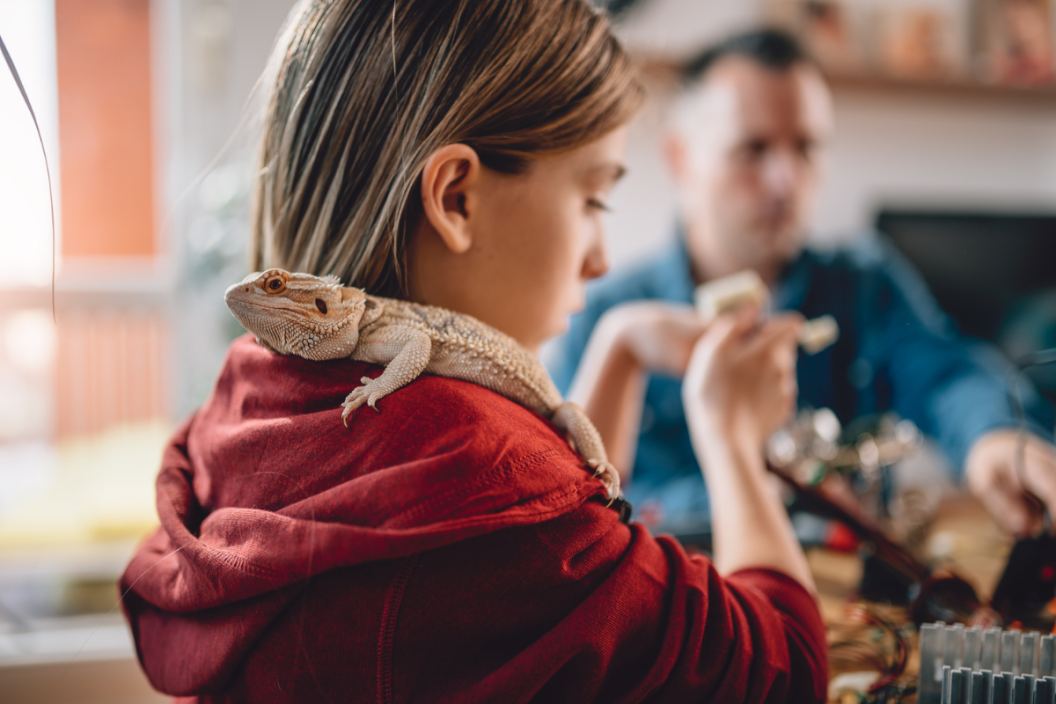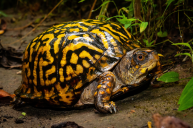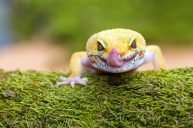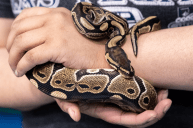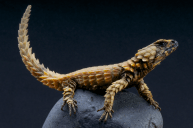Reptiles might not be the first creatures that come to mind when you think of cuddly family pets, but they are a great option for a variety of reasons. Looking for companions that are relatively easy to care for, unique, or even hypoallergenic? A snake, lizard, or turtle might be for you! That being said, reptiles come with a special set of needs unlike that of cats and dogs. Adopting an exotic pet like a reptile means deciding if they're right for your home and learning how to properly care for them.
Reptiles are available in many shapes and sizes, and while some have more complicated care requirements, others are fairly easy to look after. Whether you're just getting started in the world of reptiles or you're a veteran reptile owner, there are several species that are known for being the best pet reptiles. There's one thing they all have in common: These reptiles are relatively low-maintenance. Although they're easier to care for, it is still important to invest in the proper habitat that accommodates your pet's unique needs, the finest veterinary care, a nutritious and varied diet, and plenty of enriching toys to keep your cold-blooded companions not only healthy, but happy too. Read on to learn about the best reptiles to keep as pets!
1. Leopard Gecko
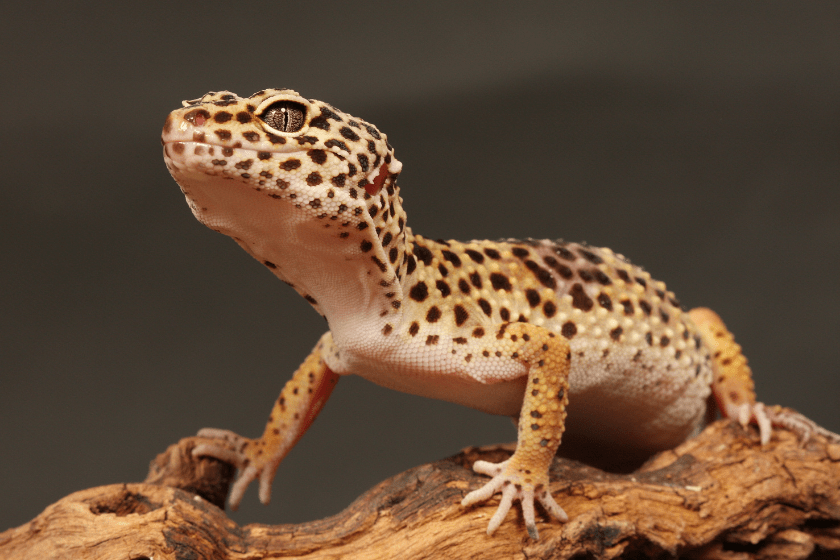
Hardy and docile, a leopard gecko makes a great pet for beginners. These spotted geckos are quiet and easy to maintain, making them great additions to any family. They are even known to smile at their owners owners, how adorable!
They have easily accessible heat and dietary requirements (they eat only insects!), contributing to the ease of ownership. They are nocturnal, however, so if your family is active early in the morning or at night, you'll get to experience their peak activity!
2. Russian Tortoise
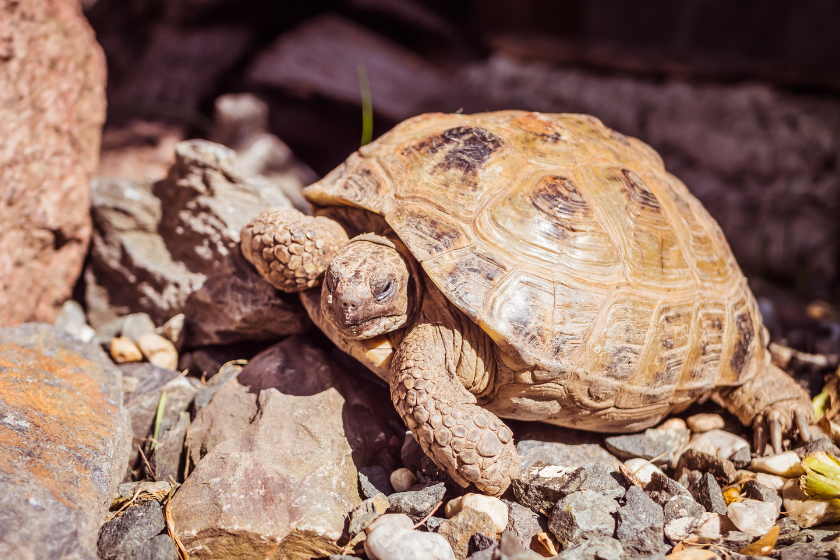
A Russian tortoise is a better choice than the popular red-eared slider because of its different maintenance requirements and ability to interact with human more easily.
Relatively small on the tortoise scale (maximum of 8-10 inches), these tortoises are very hardy, making them a great choice. They also don't have the water requirements of other reptile pets, as they get almost all of their moisture from their food. However, tortoises live for up to 50 years, which is a lengthy commitment.
3. Crested Gecko
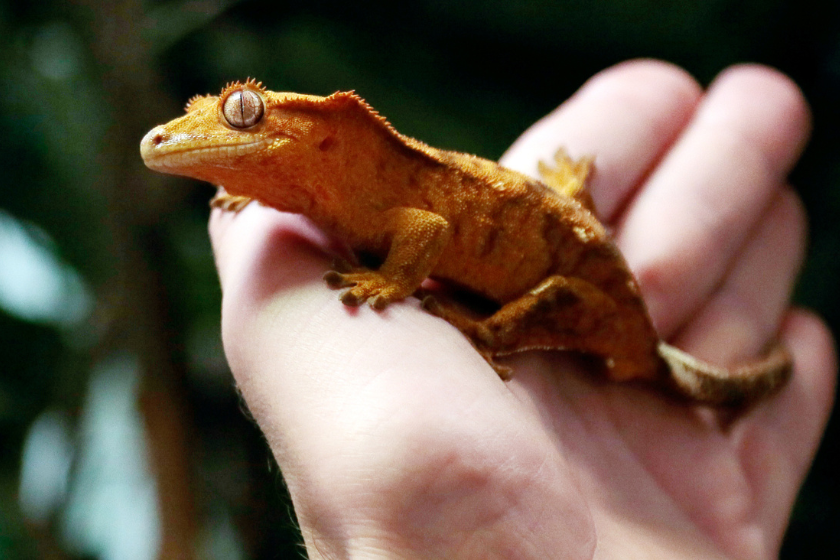
Crested geckos are generally a docile, yet entertaining reptile. This gecko species is arboreal and requires a vertical enclosure, making it an easy pet for someone who might not have a lot of space for a traditional horizontal enclosure. Their dietary needs can be easily met through insects and commercial foods, making them not only entertaining but also convenient.
There are many other things new pet owners should know about this likable lizard. For example, did you know these crested critters were thought to be extinct until just recently?
4. Ball Python
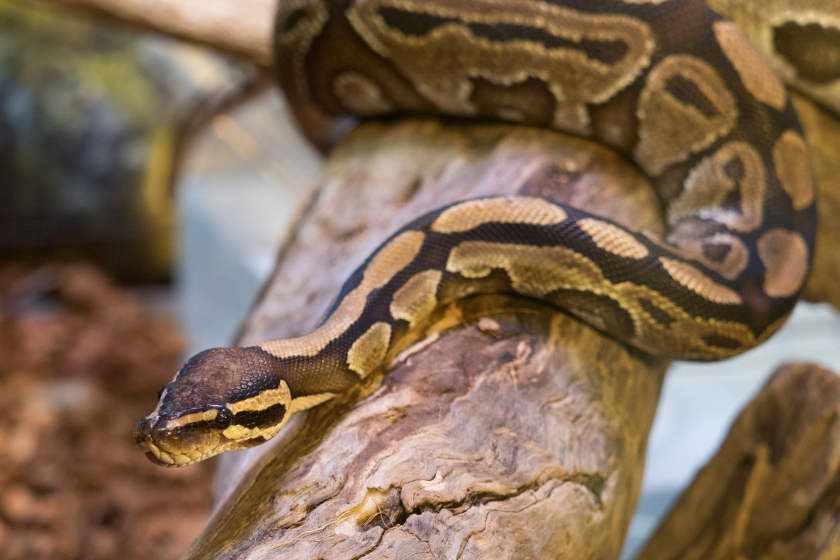
For those who would like a leg-less companion, ball pythons are one of the most popular choices. These snakes are a little shy and smaller in size, which appeals to many first-time snake owners. They come in a variety of color variations and range from three to five feet in length. Another factor to consider is lifespan, as they average around 25-30 years, which is a long time, so make sure you are committed!
They do not have elaborate tank requirements, which makes them favorable to first-time owners, and is just one of many reasons to own a pet snake.
5. Corn Snake

Smaller in size and very calm, these colorful snakes make for great pets. However, they enjoy climbing branches, so they need an enclosure that allows them some space to do so. Corn snakes spend the rest of their time hiding and burrowing. Because of their curiosity, they are incredible escape artists, so it's important to make sure their tank and lid is secure.
6. Water Dragon
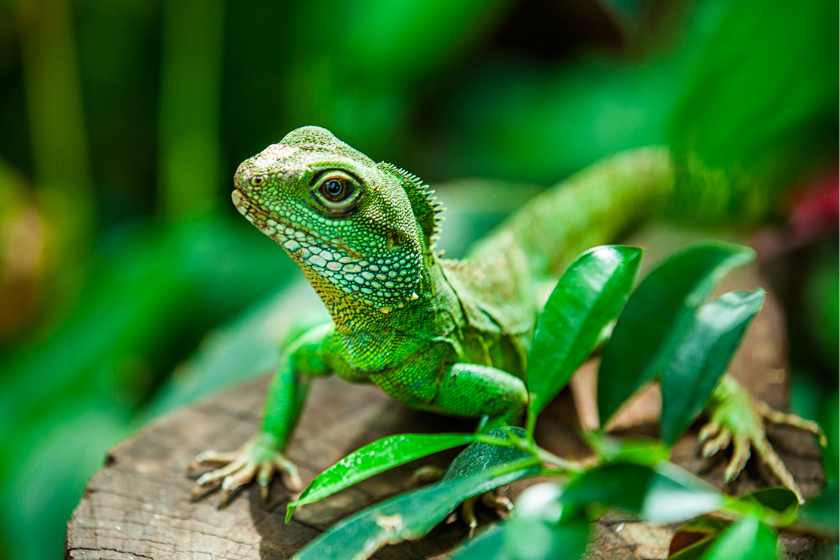
Water dragons are full of personality and spunk! With a proper and regulated habitat in place, they are capable of mostly taking care of themselves, meaning you can spend more time enjoying them than cleaning up after their humorous hijinks. Many people want to own iguanas without realizing the space they take up or aggressive nature, and the water dragon is a good compromise because they are much smaller and considerable more friendly, without losing those similar physical qualities.
7. Bearded Dragon
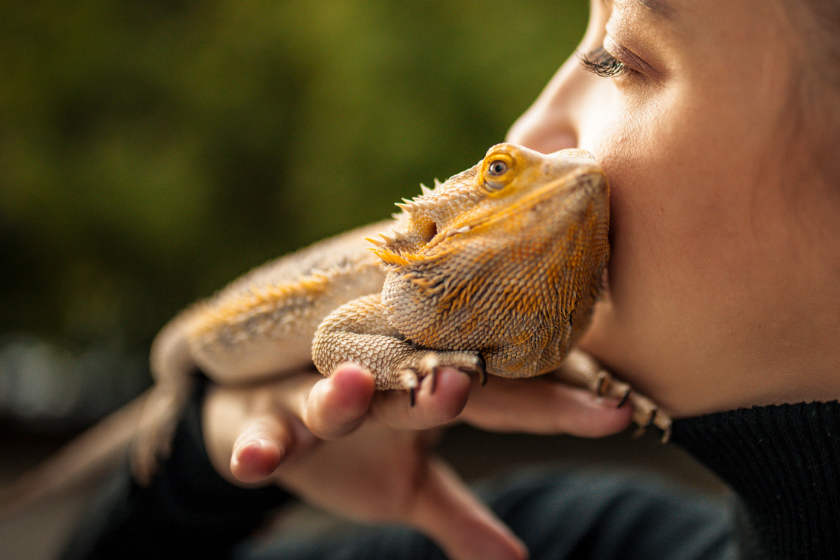
Bearded dragons have easy care requirements and, when socialized properly, love interaction. They are known for outgoing personalities that are individual to each one, making them great additions to a family. Bigger than geckos yet smaller than an iguana, this lizard species is a great size for pet lovers of all ages.
Before you bring a beardie home, there are many things you should know. Bearded dragons are omnivores, meaning they can eat a variety of things, ranging from insects to veggies. They are also diurnal, so they're awake during the day, making them a great pet for anyone who spends a lot of time at home.
8. Chameleon
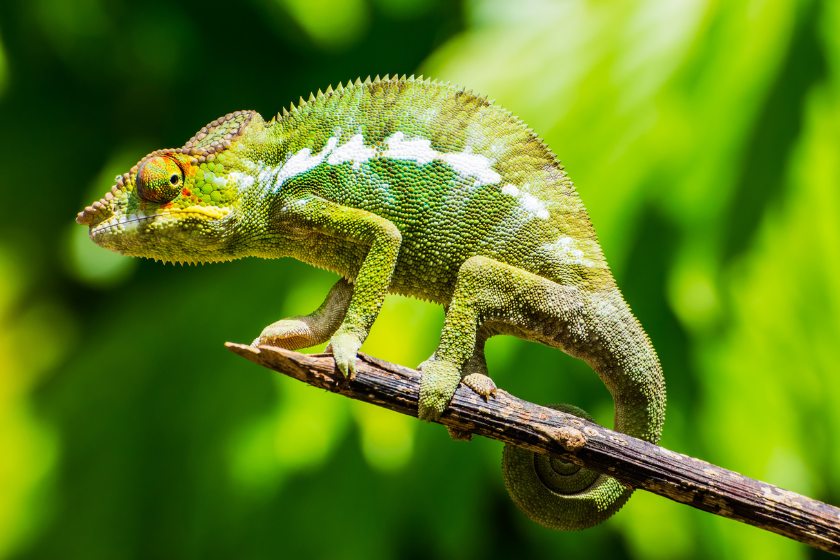
Some believe chameleons aren't the best for beginners, mainly due to their specific environment needs that must remain constant and precise, and that there are many things the average person does not know about them. Chameleons require stable, warm temperatures and regulated humidity to thrive, so investments in special heat lamps and proper bulbs are basic necessities. We recommend working with an expert to make their enclosure as comfortable and accommodating as can be.
If you're not interested in handling your pet reptile though, this is a great option as they can stress easily when handled. With their ability to change colors, they make a very interesting and unique pet if you're up for the challenge. Just make sure you don't lose sight of them!
9. Red-Eared Slider
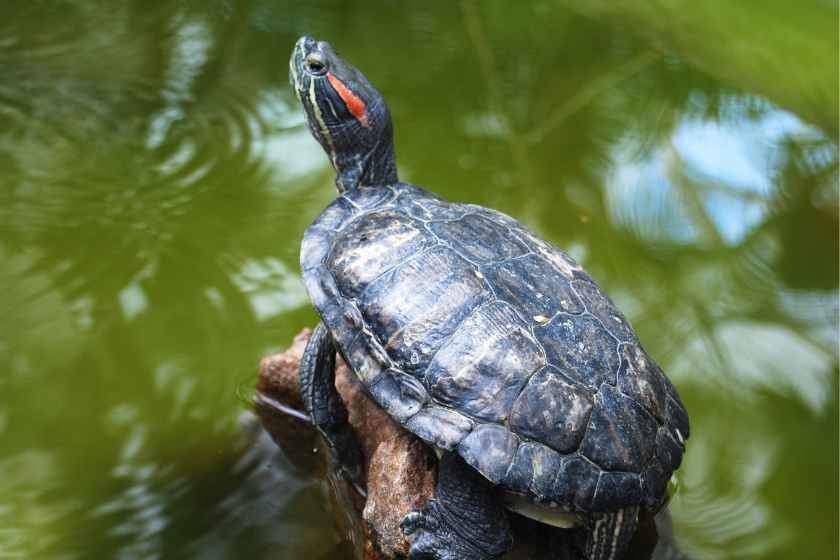
Regarded as the most popular pet turtle today, this freshwater friend requires daily nutrition when young, while the older red-eared slider can be fed once every two or three days. Recognized by a small, red stripe where its ears would be, this semi-aquatic turtle is omnivorous and considered one of the 100 most invasive species in the world.
10. African Spurred Tortoise
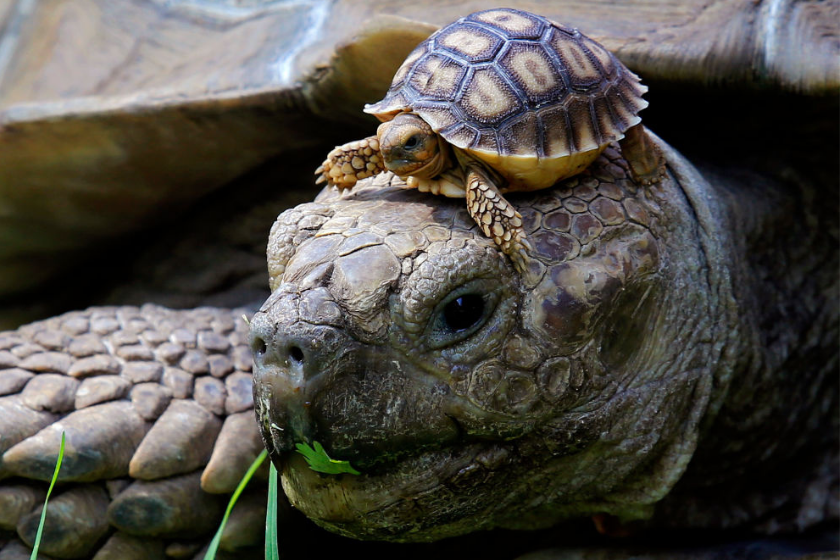
Ulises Ruiz/AFP via Getty Images
Meet one of the largest tortoise species in the world! For this reason, sulcata tortoises (as they're also known) must be housed outdoors in a well-built area offering vegetation, humidity controls, and space to roam. They are strictly herbivorous and do not require animal proteins, fruits, or prepackaged pet tortoise food. Their popularity as pets can be attributed to their ability to adapt to different conditions. Make sure you live in a generally warm climate though, as they will need an artificial heat source if temperatures drop below about 60 degrees.
One important note: With an expected lifespan around 70 years, they may outlive you, so make some plans.
11. Eastern Box Turtle

These turtles live a long time, but they do not have the aquatic requirements like red-eared sliders. Eastern box turtles live in varied climates, so they are quite adaptable and are omnivores, enjoying leafy greens in their terrariums. When it comes to keeping turtles as pets, this is a great choice for first timers.
12. Green Anole

Green anoles are small and skittish but very active. Like the chameleon, they are more of a look-don't-touch reptile, and handling them isn't recommended as they may escape. There are several things you need to know if you are going to bring one of these jittery jumpers home. They require a diet of live insects, and because they are smaller reptiles with faster metabolisms, they need to be fed more often.
While there are many low-maintenance reptiles great for both first-time reptile owners and veteran owners looking for a more laid-back reptile raising experience, there are some cold-blooded companions that beginner owners should avoid. Despite being well known, iguanas are notoriously difficult pets for inexperienced reptile owners. Their spatial needs, claws and powerful tail, and feisty (often aggressive) temper offers more bad than good for novices. We recommend avoiding iguanas, as well as any giant snake species, because they require so much special attention.
Whichever you choose, large or small, get ready for a great time with your new reptile pet!
Do you own any of these best pet reptiles? Share them on our Wide Open Pets Facebook!
